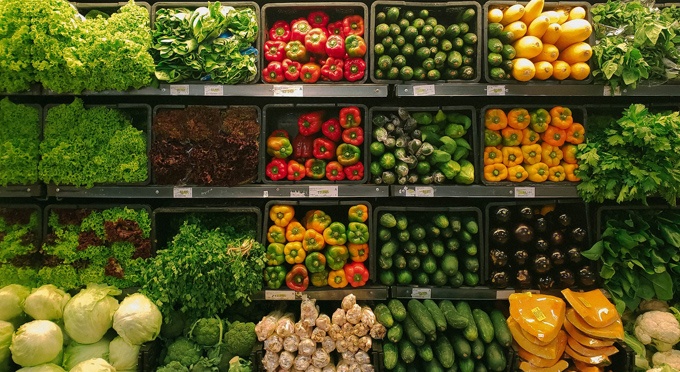
The rise of organic food is more than just a marketing trend; it’s a testament to a growing awareness of our food choices and their impact on health and the environment. Organic food isn’t just about what’s in it; it’s also about what’s not in it. The history of organic food is rich and varied, with its roots in sustainable agriculture. It has evolved into a lifestyle choice that transcends food, touching on environmental concerns, personal health, and social responsibility.
The Organic Difference
What sets organic food apart from conventionally grown produce is the way it’s cultivated and processed. Organic farming eschews synthetic pesticides, herbicides, and genetically modified organisms (GMOs), and instead relies on natural and sustainable practices. This is crucial for those concerned about ingesting potentially harmful chemicals found in non-organic produce. Organic food’s key promise is its inherent reduction of synthetic chemicals in our diet.
The Main Benefits
The health benefits of organic food are well-documented. Organic produce tends to be higher in essential nutrients because it’s grown in healthier soil. The absence of synthetic chemicals in organic farming can reduce the risk of pesticide residues in your diet, which have been linked to health concerns. Additionally, organic livestock are raised without antibiotics or synthetic hormones, reducing the likelihood of these substances ending up in your meat and dairy products.
1. Reduced Exposure to Pesticides
- Lower Pesticide Residues: Organic farming practices minimize the use of synthetic pesticides and herbicides. This means that organic produce generally has fewer pesticide residues compared to conventionally grown crops. Lower pesticide exposure can reduce the risk of pesticide-related health issues.
2. Nutrient-Rich and Flavorful
- Higher Nutrient Content: Studies have shown that organic fruits and vegetables often contain higher levels of certain nutrients and antioxidants compared to their conventionally grown counterparts. This is because organic farming focuses on soil health and natural growing practices, which can enhance the nutritional value of the produce.
- Better Taste: Many consumers find that organic food has a better taste. This is often attributed to the healthier and more fertile soil in which organic crops are grown.
3. No Genetically Modified Organisms (GMOs)
- GMO-Free: Organic standards prohibit the use of genetically modified organisms (GMOs). Choosing organic products ensures that you are not consuming foods that have been genetically engineered, which can be a concern for some consumers.
4. Antibiotic and Hormone-Free Animal Products
- Safer Meat and Dairy: Organic animal farming practices prohibit the use of antibiotics and growth hormones. This means that organic meat, milk, and dairy products are free from these potentially harmful substances.
5. Environmentally Friendly
- Sustainable Farming: Organic agriculture promotes sustainability by using practices that support soil health, reduce water and air pollution, and protect biodiversity. By choosing organic products, you support environmentally friendly farming methods that benefit the planet.
6. Fewer Additives and Preservatives
- Minimized Additives: Organic processed foods, such as snacks and canned goods, typically contain fewer artificial additives, preservatives, and synthetic chemicals, making them a healthier choice for those who want to reduce their intake of these substances.
7. Support for Local and Small-Scale Farmers
- Local Agriculture: Many organic products are sourced locally, which supports small-scale, local farmers and strengthens local economies. Choosing organic can help sustain small, family-owned farms.
8. Non-Irradiated Foods
- No Irradiation: Organic standards prohibit the irradiation of food. This means organic products are free from ionizing radiation, a process used to kill bacteria but which can potentially alter the nutritional quality of food.
9. Biodiversity Preservation
- Protecting Wildlife: Organic farming practices encourage the preservation of biodiversity. By avoiding synthetic pesticides and focusing on ecosystem health, organic farms create habitats that support a variety of wildlife.
10. Reduced Antibiotic Resistance
- Antibiotic-Free Animals: The use of antibiotics in conventional animal farming has raised concerns about antibiotic resistance in humans. By choosing organic meat and dairy products, you reduce your risk of consuming meat from animals treated with antibiotics, which can contribute to antibiotic resistance.
While the health benefits of organic food are subject to ongoing research and debate, many consumers choose organic products for their potential advantages. It’s essential to make informed choices based on your preferences and priorities. Whether you prioritize reduced pesticide exposure, support for sustainable farming, or other factors, organic food can be a valuable addition to your diet.

A Growing Movement
Organic food is not merely a niche interest. It’s a growing movement, with more people recognizing the importance of their food choices. While the percentage of people exclusively consuming organic food may still be a minority, there’s an increasing trend of people incorporating organic options into their diets. This shift is driven by a growing awareness of the health and environmental consequences of conventional farming practices.
Avoiding Harmful Ingredients
The ingredients to avoid in conventional foods are primarily synthetic chemicals like pesticides, herbicides, and synthetic fertilizers. Conventional produce can also contain genetically modified organisms (GMOs), which have raised concerns about their long-term effects on health. Processed foods, often laden with artificial additives, excessive sugar, and unhealthy fats, are another culprit in the modern diet, contributing to various health issues.
Synthetic Chemicals
One of the primary reasons for choosing organic food is to avoid synthetic chemicals commonly found in conventional agriculture. These chemicals include synthetic pesticides, herbicides, and fertilizers. Their purpose is to protect crops and increase yields, but they often leave behind residues on the food we consume. Exposure to these chemicals has been linked to various health concerns, including potential risks to the nervous system, endocrine disruption, and cancer.
Genetically Modified Organisms (GMOs)
Genetically modified organisms (GMOs) are a source of concern for many health-conscious consumers. GMOs are plants or animals whose DNA has been altered in a way that doesn’t occur naturally. These modifications are often made to enhance a crop’s resistance to pests, increase its yield, or make it more tolerant to herbicides. While proponents argue that GMOs can help feed a growing global population, critics worry about their long-term effects on health and the environment. Choosing organic foods ensures that you avoid GMOs, as they are not permitted in organic farming.
Processed Foods
The rise of processed foods in our diets has brought with it a range of unhealthy ingredients. These include excessive added sugars, artificial flavorings, preservatives, unhealthy fats, and highly refined grains. Processed foods are convenient but often lack essential nutrients and can lead to various health issues, such as obesity, diabetes, and heart disease. When you choose organic food, you’re more likely to avoid these additives because the organic philosophy places a stronger emphasis on the purity and simplicity of ingredients.
Antibiotics and Hormones
Conventional livestock farming frequently involves the use of antibiotics and synthetic hormones. Antibiotics are administered to prevent disease outbreaks in crowded factory farm conditions, but their use has raised concerns about antibiotic resistance in humans. Synthetic hormones are often given to promote faster growth and increased milk production in cows. By choosing organic meat and dairy products, you avoid these substances, contributing to a more sustainable and health-conscious diet.
Avoiding harmful ingredients in your food choices is a proactive step toward a healthier and more sustainable lifestyle. By opting for organic food, you reduce your exposure to synthetic chemicals, avoid genetically modified organisms, and steer clear of many unhealthy additives commonly found in processed foods. The organic food movement promotes a return to simpler, more natural, and cleaner ingredients, contributing to better overall health and well-being.
Pesticides and Health
Pesticides used in conventional farming can have adverse effects on human health. Residues of these chemicals can make their way into our bodies, with potential consequences ranging from allergies and skin conditions to more severe long-term health concerns. Choosing organic food means avoiding these risks, making it a healthier choice for consumers.
Residues on Produce
One of the most significant concerns regarding pesticides in conventional foods is the residues that can remain on fruits and vegetables. Pesticides are used to protect crops from pests and diseases during growth, and these chemicals can linger on the produce you buy at the store. While the levels are generally considered safe for most consumers, repeated exposure to these residues, especially in children and pregnant women, may lead to health issues.
Potential Health Risks
Exposure to pesticide residues in food has been associated with various health risks, including:
- Organic System Dysfunction: Pesticides can interfere with the endocrine system, potentially leading to hormone disruption. This can have long-term effects on reproductive health, growth, and development, and it may contribute to certain cancers.
- Neurological Effects: Some pesticides are known neurotoxins and may harm the nervous system. Exposure to these substances can lead to symptoms such as headaches, dizziness, and, in severe cases, seizures and paralysis.
- Cancer Risk: The International Agency for Research on Cancer (IARC), a division of the World Health Organization, has classified some pesticides as possible or probable carcinogens. While more research is needed to establish clear links, long-term exposure to certain pesticides has been associated with a higher risk of cancer.
- Reproductive Health: Pesticide exposure, particularly in agricultural workers, has been linked to reproductive issues. For example, it may reduce fertility in men or lead to birth defects in their children.
- Developmental Concerns: Children and pregnant women are more vulnerable to the effects of pesticides. Prenatal exposure to certain pesticides can impact a child’s cognitive development and behavior.
Reducing Pesticide Exposure
Opting for organic foods is one way to reduce pesticide exposure since organic farming practices minimize the use of synthetic pesticides. Additionally, you can follow these practices to reduce pesticide exposure:
- Wash Produce: Thoroughly wash fruits and vegetables, even if you plan to peel them. This can help remove some pesticide residues.
- Peel When Appropriate: For produce with thick or inedible peels, such as bananas or oranges, peeling can further reduce pesticide exposure.
- Diversify Your Diet: Rotate your food choices and consume a variety of fruits and vegetables. This can reduce prolonged exposure to specific pesticides.
- Choose Organic for High-Risk Foods: Some foods tend to have higher pesticide residues than others. When possible, prioritize organic versions of the Environmental Working Group’s “Dirty Dozen” list, which includes produce like strawberries, spinach, and apples.
While more research is needed to fully understand the long-term health effects of pesticide exposure, it’s prudent to reduce your intake of these chemicals where possible, particularly if you are concerned about potential health risks. Opting for organic produce and practicing good food safety habits can be important steps toward minimizing pesticide exposure.
The organic food movement is more than just marketing hype; it’s a conscious choice toward healthier eating. It’s a testament to the increasing awareness of the link between our food choices, our well-being, and the environment. By opting for organic food, we not only reduce our exposure to harmful chemicals but also support a more sustainable and environmentally responsible food system. Organic food isn’t just a trend; it’s a commitment to a healthier and more conscious way of eating.
Have a favorite organic food? Share with everyone by using the comments section below?
Made the switch to organic? How are the results? Good or bad, we would love to hear your feedback about eating organic food.